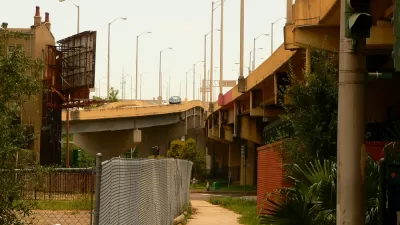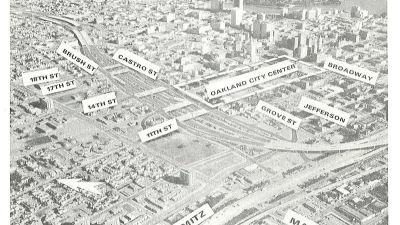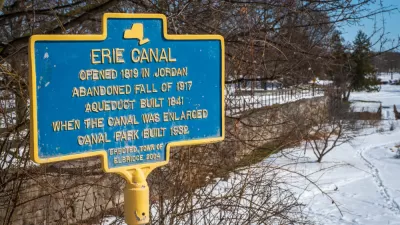From Denver to Syracuse, U.S. cities are looking to heal neighborhoods torn apart by the construction of the Interstate Highway System. Could an alternative way of envisioning and financing such a system provide lessons for the developing world?
In a paper published in this month's Transport Policy, Marlon Boarnet, director of the graduate urban planning program at USC, "outlines a series of lessons that developing countries might learn from America's great road expansion experiment," writes Eric Jaffe. "By far the most compelling is his suggestion that the Interstate Highway System should have been two distinct systems: one running between cities, and another running within them."
By planning, financing, and governing intracity and intercity road systems separately, Boarnet believes the negative impacts of running highways through cities could have been avoided.
"To be sure, the Interstate Highway System did an enormous amount of good for the United States, but in retrospect the decision to thread it through cities was a great mistake," observes Jaffe.
FULL STORY: What the Interstate Highway System Should Have Looked Like

Planetizen Federal Action Tracker
A weekly monitor of how Trump’s orders and actions are impacting planners and planning in America.

Map: Where Senate Republicans Want to Sell Your Public Lands
For public land advocates, the Senate Republicans’ proposal to sell millions of acres of public land in the West is “the biggest fight of their careers.”

Restaurant Patios Were a Pandemic Win — Why Were They so Hard to Keep?
Social distancing requirements and changes in travel patterns prompted cities to pilot new uses for street and sidewalk space. Then it got complicated.

Platform Pilsner: Vancouver Transit Agency Releases... a Beer?
TransLink will receive a portion of every sale of the four-pack.

Toronto Weighs Cheaper Transit, Parking Hikes for Major Events
Special event rates would take effect during large festivals, sports games and concerts to ‘discourage driving, manage congestion and free up space for transit.”

Berlin to Consider Car-Free Zone Larger Than Manhattan
The area bound by the 22-mile Ringbahn would still allow 12 uses of a private automobile per year per person, and several other exemptions.
Urban Design for Planners 1: Software Tools
This six-course series explores essential urban design concepts using open source software and equips planners with the tools they need to participate fully in the urban design process.
Planning for Universal Design
Learn the tools for implementing Universal Design in planning regulations.
Heyer Gruel & Associates PA
JM Goldson LLC
Custer County Colorado
City of Camden Redevelopment Agency
City of Astoria
Transportation Research & Education Center (TREC) at Portland State University
Camden Redevelopment Agency
City of Claremont
Municipality of Princeton (NJ)





























